Choosing the right digital marketing techniques is key for positive ROI. For B2B, SEO builds long-term organic growth while SEM quickly scales paid ads.
Conduct keyword research to identify high-demand queries. Target these with optimized content and technical on-site SEO. Also bid on keywords through SEM campaigns.
Track conversion rates and ROI, then double down on top performing strategies.
Work with an experienced marketing agency to optimize integrated SEO and SEM. This maximizes visibility for your B2B brand.
The short answer is no, you don’t have to choose between any but rather know the one which may benefit you more.
Asking for advice on whether to use SEO or SEM is the proverbial “apples against oranges” issue. In digital marketing, SEO and SEM serve very distinct tasks, goals, and intentions.
For example, you may generate traffic using SEM tonight and potentially spend a lot of money and get some benefits in 2 hours, however any SEO strategy will take 90 to 120 days to see results.
Costs vary (SEM is always more expensive in the medium to long term), conversion rates vary, and engagement rates vary.
That’s why the discussion between SEO and SEM are based on the incorrect premise that you must pick between the two. No, you don’t. And you shouldn’t either!
–Digital Authority
Any marketing expert who has been around the block a few times will advice you to never prioritize one over the other.
Instead, think about the advantages and disadvantages of each plan and map them to your company’s goals for the next month, three months, year, and so on.
As a result, we’ll look at both SEO and SEM in this of ”piece of article”. Their advantages and disadvantages, when to use one over the other, and what to do instead of picking one.
We’ll go through the differences in detail, as well as the benefits and downsides of each.
What is SEO in Digital Marketing?
Search engine optimization (SEO) is a collection of strategies used by digital marketers to improve the quality and quantity of organic search traffic to a website. In other words, SEO is a collection of strategic strategies aimed at propelling your website to the first page of Google’s search results.
SEO, when done effectively and creatively, can be extremely beneficial to a company’s overall success. It can help businesses generate more leads and sales, raise brand awareness, and manage their reputation.
Here’s a good example of SEO. Type in ‘’Buy football in Ghana’’ in Google and chances are you will see websites that have really optimised their blog on this topic at the top of search results. Decathlon Ghana’s website received ~over 3500 monthly visitors to their website as a result of being #1 search result for this keyword as of June 11, 2022

There are multiple search engines in to rank on. Google takes the lion’s share, 88.6%. But, don’t forget other notable search engines: 6.01% Bing, 4.09% Yahoo, and 97% DuckDuckGo. But to simplify things, my suggestions and analysis in this article is primarily geared toward Google.
Google results are often monitored first and foremost by SEO engineers, and for good reasons:
- Every minute, Google processes an average of 73k searchers from global online users
- At least one in 6 people worldwide is a daily “Googler”
- Google serves more than 3.5 billion and 1.2 trillion searches every given day and year respectively
- Desktop Google searches have been overtaken by mobile searches in more than 10 countries, including Ghana, Nigeria, China, Japan and the US
- The top 5 results in Google Search Engine Results Pages (SERPs) hive off close to 70 percent of all click-throughs
- Almost 18 percent of local/mobile searches on Google convert into a same-day sale
- Search engines, which may just as well be named Google searches, account for over 90% of all web traffic (HubSpot).
The above is from Digitalauthority.me
Read Also;
What Precisely Is SEO -Search Engine Optimization?01
In Summary: On any given day, a large number of internet users are searching for what you have to offer on Google. Whatever the case may be, ranking in the top five results on Google’s initial search results page is critical.
When all is said and done, the primary purpose of SEO is to attract as much qualified visitors as possible to your website.
Over time, well-optimized websites gain more traffic, which equates to more leads, visibility, and money. Online users will not be able to find your website/business without good SEO, and all of your efforts will be for naught.
Furthermore, businesses do poorly in SEO, frequently employing ineffective SEO techniques that, simply, result in epic failures.
However, it’s important to remember that SEO is an ever-changing process, with changes in search engines and your competition necessitating adjustments to your plan.
As a result, you must stay on top of important SEO ranking elements. These are the criteria that will help you dominate search and attract web traffic from all sides.
What Are The Top 8 Ranking Factors For Google?
Today, the most powerful and performing SEO ranking factors include:
- Accessible site
- High-quality content.
- On-page optimization.
- Technical SEO
- Domain authority (DA), URL and age
- Internal links.
- External links.
- Accessible business info
- Accessible site: You can’t rank unless Google crawlers and bots can find and access your website and its pages. Use a neat sitemap and robots.txt file to help the crawlers out.
- High-quality content: Quality of content is nothing new. When Google first announced the change in 2011, there was some disagreement over what constituted “new content.” So, what exactly is it? And how does the concept of freshness apply to evergreen content? Don’t just change the date on evergreen content every year. To determine what has to be renewed, you must go into the meat of the content. For example, if you created a tool listicle, you might update each tool’s pictures, pricing, and information.
- On-page optimization: On-page optimization, which deals with the “behind the scenes” components of your content and SEO, is closely tied to Page Experience. These elements have been there for a long time and continue to have a substantial impact on the visibility and SERP position of your website for your target keyword themes.
- Technical SEO: Your website’s coding should also be stable and search engine friendly. Create Meta titles and descriptions that include a few keywords. Alt tags should be used for all photos, movies, and non-text content. Don’t forget about HTML and schema markups; they’re important for technical SEO as too.
- Domain authority (DA), URL and age: Your DA reveals a lot about the search dominance of your website. According to Ahrefs, more than 60% of the domains in the top ten Google results have been around for more than three years.
- Internal links: Internal link structure aids in the discovery of pages by users and search engines. Corey Morris, Voltage’s Vice President of Marketing, discusses how to prioritize your internal connecting structure. Think about how internal link structure can help guide users toward completing a conversion from signing up for your newsletter to completing a request for a live demo.
- External links: If you want to rank well, one of the most important SEO components will continue to be linked. Ignore those who claim that you can succeed without inbound links (a.k.a., backlinks). While some sites can and have done so, it would be foolish not to pursue any effective link-building techniques Because each industry is distinct, different link-building opportunities exist for each.
- Accessible business info: This is particularly true when it comes to local SEO rankings. Your website should provide easily accessible and understandable business information, such as your physical address, company name, and phone number. Increase your visibility by adding your company to Facebook and Google My Business. Additionally, to rank this content, employ relevant local search terms.
What is SEM in Marketing?
Simply put, search engine marketing (SEM) is the practice of paying to appear in search results. And what does that signify in terms of answering the question of whether SEO or SEM is better?
The technique of paying for adverts to appear in organic search results for specific keywords, search platforms, and demographics is known as pay per click (or CPC). This means that regardless of the person’s motive or whether they buy from you, you’ll be charged for each click that leads to your website.
Let’s look again at an example where ”Cake city Ghana” organically ranks as the #1 search result for ”buy cakes online”.
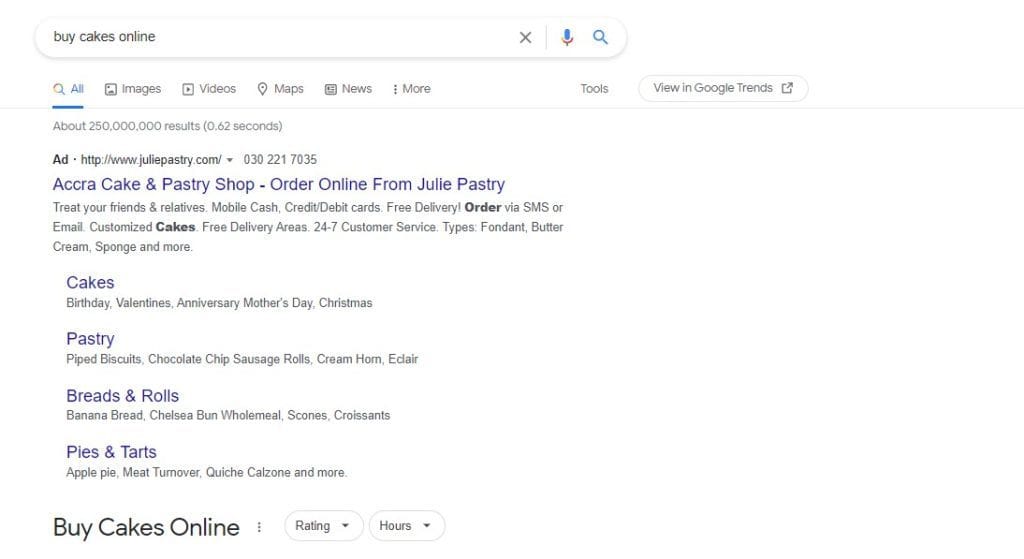
As you can see, right above the organic search result for ”Buy cakes Online”, there’s an ad from ‘‘Julie pastry’‘, a cake shop paying to have the ad shown in Google search results. For whatever reason, Julie pastry either didn’t invest in SEO for this search term or decided it’s better and quicker to just pay to be at the top of search results.
But here’s the catch. If I were to click on that ad, which I didn’t because it would be in poor taste, Julie pastry would have been charged $0.55 – 2.34 for my click according to Searchlabdigital data.
Read Also;
Top New SEO Agency Services in Ghana-SEO
Bottom line:
SEO focuses on making your website more visible within the search results. whiles
On the other hand, SEM– pay-per-click advertising (PPC) is a form of online advertising where advertisers pay each time a user clicks on their ad. ”PPC ads” appear at the top of search results, so they’re often seen by people who are actively searching for something.
Let’s get started on the benefits and drawbacks of both tactics so you can make an informed decision: SEO versus SEM.
5 Pros of SEO in Digital Marketing.
1. SEO generates high-quality traffic and leads;
Organic Google traffic is the best quality traffic available. This is because search engine users are most likely looking for items, services, and solutions that you may provide. One of the most effective inbound marketing methods is SEO. It assists you in attracting high-quality traffic to your website, resulting in increased lead production.
Even in terms of quantity, search engines perform admirably, attracting a big volume of visitors from all across the internet.
[SEO] not only generates high-quality traffic, but it also boosts conversions over time.
That’s right: SEO traffic is more likely to convert into leads, sales, and activities than other types of traffic. In other words, ”Julie pastry” would pay $100+ a month for the hypothetical example above and receive only a fraction of the leads that “Cake city Ghana” received by being the top search result.
You are preparing your website to obtain a lot of qualified organic traffic by investing in SEO. As a result, your company and business are better positioned to generating more leads and conversions in the long run. What’s more, organic traffic often accounts for more than 45% of income for most digital enterprises.
Lets look at a popular example;

As seen above, ”Jumia Ghana” receives 392.9k organic traffics per month and also ranks for 59.6k keywords because they actively invest in SEO. Its of no doubt why they are the biggest e-commerce business in Ghana
2. Because you’re shutting out your competitors, SEO boosts sales;
SEO is a very effective sales strategy. Articles, blog posts, white papers, case studies, in-depth reports, and other types of material that you develop (or have already created) can all be used for SEO purposes. More specifically, SEO material can be used as evidence for the (ROI) of effort or for linking to or from content.
Also, let’s face it: your items or services are competing with a few (or a lot) of other equally good competitors. That’s where search engine optimization (SEO) can help. Keep in mind that your competitors are most likely also spending in SEO.
As an SEO firm, we promise and deliver precisely that. We’ll pull a complete report and show you how to compare if you tell us who your most direct or greatest competitors are. The next step would be to use this information to outperform your competitor and leave them in the dust in the ”search game” .
3. SEO has a higher long-term return on investment than SEM;
When it comes to long-term results, SEO is the clear champion in digital marketing field. While you may have to invest more money to get your SEO strategy and campaigns off the ground, you will more than make up for it in the long run.
Remember that SEO is all about creating engaging, keyword-optimized content and staying on top of your website’s code.
In comparison to SEM advertising that you must support day in and day out, year after year, the ongoing costs are quite cheap.
Lets look at a similar example;
Most of our customers spend $10,000 to $15,000 a month working with us on SEO campaigns, according to Digital Authority Partners(DAP). This includes creating new material, optimizing existing content, reaching out to venues that accept guest pieces, publishing articles, and reporting on SEO metrics, among other things.
-Digital Authority Partners
On our own SEO efforts, we paid roughly $16,000 per month in labor costs. As of March 2019, DAP received 3,561 visitors for the term ‘healthcare marketing’ and its variants. It would have cost us $67,659 if we had to pay for that traffic. Do you see the distinction? DAP ranks organically for 1,200 different keywords, and that’s only for one term.
Read Also;
#7 Ways on How to Use Google Trends for SEO & Content Marketing
4.If you’re ready to put in the effort and wait for the benefits, SEO is a fantastic investment;
SEO will help you generate quantifiable and trackable outcomes, whether you’re a little business, an e-commerce site, or a Fortune 500 corporation.
This means you won’t be caught off guard when it comes to SEO ROI’S.
When hiring an SEO agency, this is extremely crucial because you will be able to track every aspect of their search engine optimization strategy and results, including traffic, site rankings, lead generation, conversions, and sales.
Similarly, you won’t have to pay for SEO clicks, which is the crowning glory. You pay for a professional team to help you rank organically in Google, but once you’re on the first page, you don’t have to pay every time a visitor comes to your site.
If you build a website that Google considers traffic-worthy, you will continue to receive significant traffic as long as you follow SEO best practices and follow search engine policies.
The beauty behind search engine optimization is that your target users are already actively looking for what you offer online. And given that organic search traffic is already qualified, SEO will result in more cost savings for your business
5.SEO ranking sells 24 hours a day, 7 days a week;
The top SEO rankings never sleep. Unlike advertising, which only runs for the time period you paid for, SEO top results will continue to improve your brand, drive traffic, generate more leads, and increase sales 24 hours a day,7 days a week and 365 days a year.
SEO, calling it “ as “Cornerstone” of digital marketing, works similarly to a shop assistant, but doesn’t take vacations, weekends, or holidays.
The best part is that the clicks are completely free.
Cons of Search Engine Optimization – SEO
The backbone of digital marketing is SEO. That is something I believe we can all agree on. It does, however, have some disadvantages. And it’s critical to emphasize these flaws if we’re going to fully comprehend the differences between SEO and SEM.
1.SEO isn’t a one-shot deal;
SEO is a continuous process. It’s not a one-and-done approach; you’ll need to put in some effort and time.
As a general guideline, you should keep nurturing your SEO efforts.
Creating more fresh and trending content on-site and off-site optimizations, altering your SEO strategy over time, keeping up with technical SEO, and much more are all common examples.
In May this year, Google, for example, released a huge SEO upgrade. This had an impact on 56% of all Google ranks. Google is recognized for introducing new updates on a regular basis, and your SEO strategy must adapt to keep up.
2.It takes at least three to six months for SEO to provide results;
As the saying goes, Rome was not built in a day, and SEO vs SEM is no exception. How long does it take to be on the first page of Google’s search results?
It can take up to a year to get included as Google’s No:1 search result, depending on what you do, offer, and past SEO experience.
If you want to be on the first page of search results, it will take an average of 90 days for a good SEO service to assist you to get there.
This can be a significant issue if you require immediate results. SEO, on the other hand, is all about the long game. You’ll have to put your faith in the procedure. After all, the advantages of a high SEO ranking are indefinite and long-term. “A great SEO agency will assist you to reach page one of search results in an average of 90 days”
3.When you implement SEO, you’re competing with the rest of the Internet;
The online world has more competition than you might think.
Standing out online means outranking competitor websites. Research what they offer, their prices, and user experience. This competitive analysis helps build an SEO strategy to surpass them.
If your supermarket faces a rival store nearby, visit and take notes. Apply that to optimizing your ecommerce site.
Research which sites rank high for your key terms. Study their technical SEO, content, backlinks and optimizations.
Identify weaknesses you can leverage. Create targeted content that solves searcher intents better. Focus on user experience and conversion rate optimization.
Partnering with an experienced ecommerce SEO agency gives you an expert competitive edge. On-page optimizations, link building and conversions analysis are key.
Conducting competitor research identifies how to differentiate your ecommerce website. With data-driven SEO and compelling content, your site can stand out and rank higher.
4. SEO isn’t cheap;
While SEO is a cost-effective inbound marketing strategy, it isn’t exactly cheap. Search engine optimization requires a significant monthly retainer in order to rank for your keywords. To see results during the first 3-6 months, you’ll need a budget of at least Ghc5,000 to Ghc9,540 every month that’s roughly $628 to $1,200.
Let’s look at the benefits and cons of SEM now that we’ve looked at SEO.
Pros/Benefits of Search Engine Marketing – SEM
When deciding between SEO and SEM, it’s also crucial to examine the benefits of an SEM strategy.
- They are great for quick results;
Google paid search advertising is referred to as “search engine marketing.” This method is frequently employed as a short-term tactic for gaining quick exposure for your products or services. Paid search advertisements, as opposed to SEO, can provide immediate results because they allow you to reach your target clients almost instantly.
2.Search Engine Marketing (SEM) helps in the visibility of highly competitive target keywords.
SEM might be useful if users are looking for certain terms linked with your company’s name or services. It can be used to ensure that anyone searching for these terms clicks on the link at the top of the page.
Furthermore, there are some terms for which organic ranking will take a long time. Those are phrases that are meant to be purchased. To be honest, some keywords may be impossible to rank for organically.
Read Also;
How to Best Optimize Your [SEO] for Great Profit?
Example ; the search for ”How to do SEO”
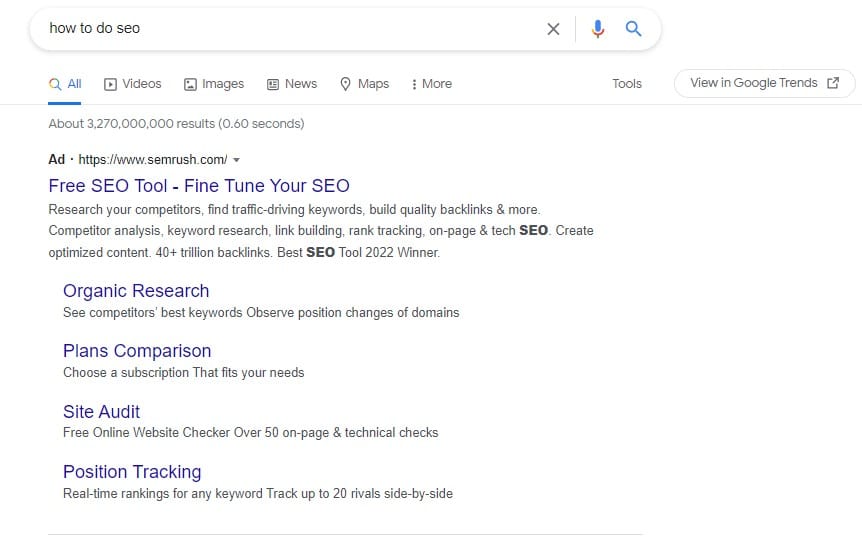
From the above you could see ”SEMrush” ranking for this target keyword. It is estimated that SEMrush budget on this targeted keyword could sum up to $4.89k or more on a monthly basis due to the high demand for SEO and search queries on ”SEO”
3.Increase Ad Visibility to Increase Traffic;
Because they appear above the organic results on the Search Engine Result Page – SERP – Optimized Search Ads can deliver relevant visitors to your website. You may improve the quality of your ads and thus assure high ad visibility and relevant website visitors by using the proper advertising budget, optimized bidding, and compelling ad wording.
4.SEM is perfect for retargeting;
Both [SEO] and [SEM] can aid in the growth of your website’s traffic. But what about retargeting those visitors who didn’t complete the activity you wanted them to? That’s where SEM really shines.
It’s a brilliant strategy to retarget people who come to read or write your content but don’t convert the first time.
You can tag such users and offer them adverts on other sites to bring them back to your site using effective SEM.
Some articles from SEMrush are subjected to PPC ads. As a result, even if you leave this website after reading their post, you may encounter ”SEMrush” advertisements on other websites.
Read Also;
What Precisely Is SEO -Search Engine Optimization?01
Keyword Match Types Can Help You Target Audiences.
The Google Keyword Planner tool can assist you in determining the most popular search terms for your company. You can ensure that your advertising reach the proper audience by employing these exact keywords in your campaigns. Google Ads provides you with a variety of keyword matching options, such as broad match, precise match, and so on, based on which your ads are presented to users.
Cons/disadvantages of Search Engine Marketing – SEM
We’ve already shown that SEM is excellent for boosting your site’s ranking in Google’s ad spots in the short run. However, that is only half of the story. PPC is not a long-term sustainable strategy for any organization that has run SEM advertising for the following reasons:
1.SEM is quite expensive and requires the use of specialist resources;
There’s no doubt that SEM is always expensive. I’d like to emphasize that running SEM advertisements against ‘healthcare marketing’-related search phrases and receiving the same number of traffic as we do organically would cost us roughly $65,000 per month.
SEM campaigns that are well-designed and handled can offer focused traffic, but they are fairly costly. To make matters worse, the targeted traffic disappears once the campaign is over.
source: Digital Authority Partners
2.It’s annoying;
SEM, in contrast to other options such as native advertising, entails “invading” the user’s space with content that they did not seek out. In fact, if the user you’re targeting uses an ad blocker, your adverts might not be seen.
Best Search Engine Optimization Agency in Ghana-SEO
3. You get what you pay for;
You have to pay to obtain good results in the world of SEM marketing.
Get this: Google AdWords’ average pay per click on the display network is $0.58, while it’s $2.32 on search results pages. That’s a massive price increase. The more you pay, the better the results should be. There has never been more intense competition for keywords.
SEO Vs SEM-Which is the better search approach for you?
Many marketers and organizations will have to choose between SEO and SEM when attempting to increase their search dominance.
SEO is like working out and getting in shape at the gym, while SEM is like an energy drink, as they say in the online marketing world. Which one would you choose? SEO, of course, because it produces long-term results.
Source: Digital Authority Partners
As can be seen, SEO provides a broad variety of benefits to both small and large businesses across the digital business spectrum. The following are some of the top SEO advantages:
- Great leads – It contributes to the generation of qualified organic traffic, the generation of additional leads and/or sales, and the gradual increase in conversions.
- SEO provides a 6X better return on investment than SEM.
- Long-term ROI – simply keep your site updated with new, optimized material on a regular basis to maintain your top SEO rating. As long as you follow search engine SEO criteria, it will continue to bring in high-quality visitors.
- Aids in the development of credibility and trust – A high SEO ranking is a symbol of authority.
- From the user’s perspective, this can assist your business, brand, and corporation appear more reputable and trustworthy.
- SEO is a powerful marketing channel that can also support your sales staff.
- Higher reach and traffic potential: Organic traffic accounts for 70% or more of all search engine clicks.
Read Also;
Importance of SEO to E-commerce – Is it An Important Part Of Any Ecommerce Marketing Plan?
Unfortunately, SEM has a large list of drawbacks:
- People are prone to dismissing paid search adverts.
- To acquire good results, you must pay a high price.
- When the campaign is over, the targeted traffic stops.
- It’s prohibitively expensive, particularly for start-ups and small firms on a shoestring budget.
- Because of spam and other less-than-savoury advertising practices, people are wary of biting into adverts.
- SEM involves a big financial investment.
The list could go on forever.
In Conclusion: SEO Vs SEM
While deciding between SEO and SEM, three aspects must be considered: your timeline, your money, and your long-term objectives.
Need Our SEO OR SEM Services?
Connect with us today

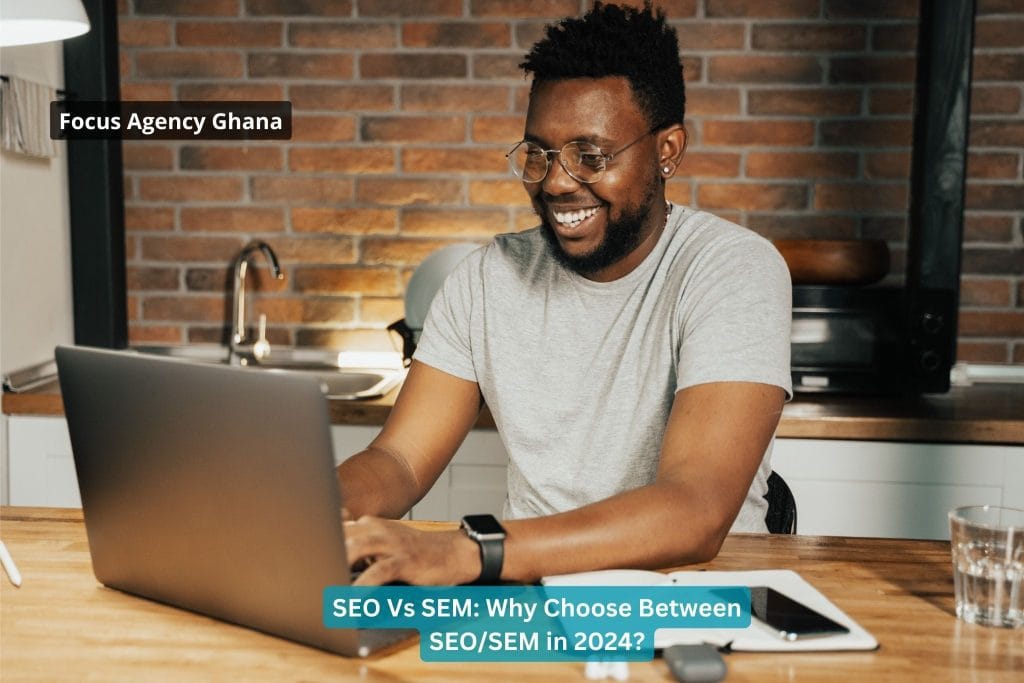
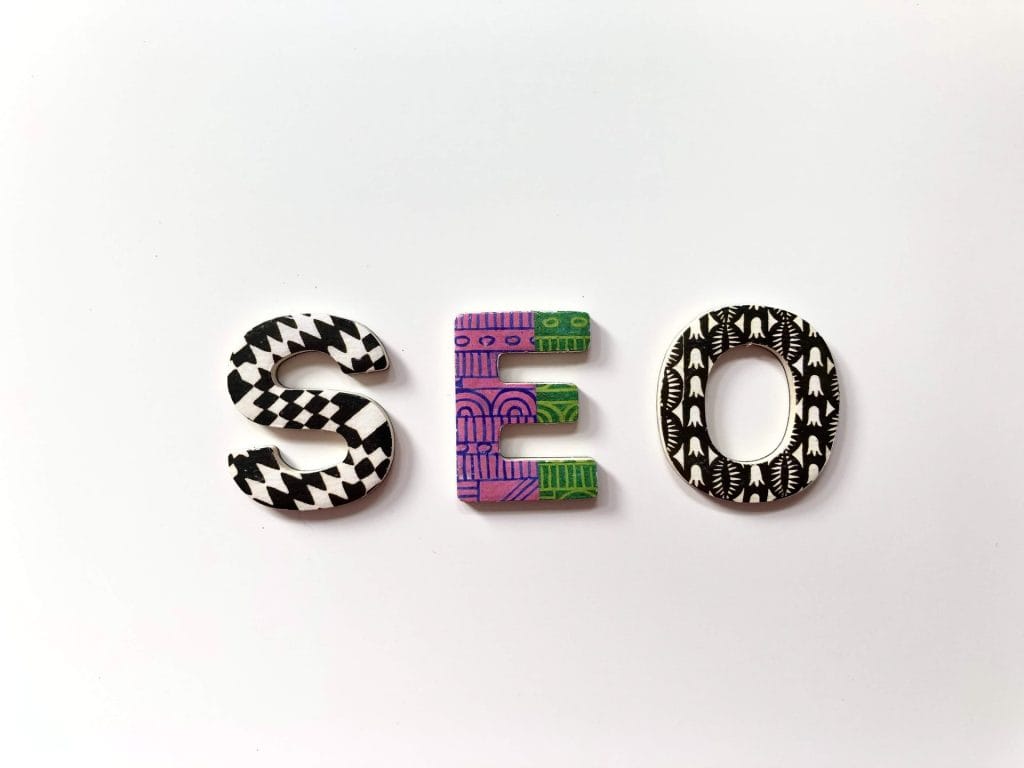
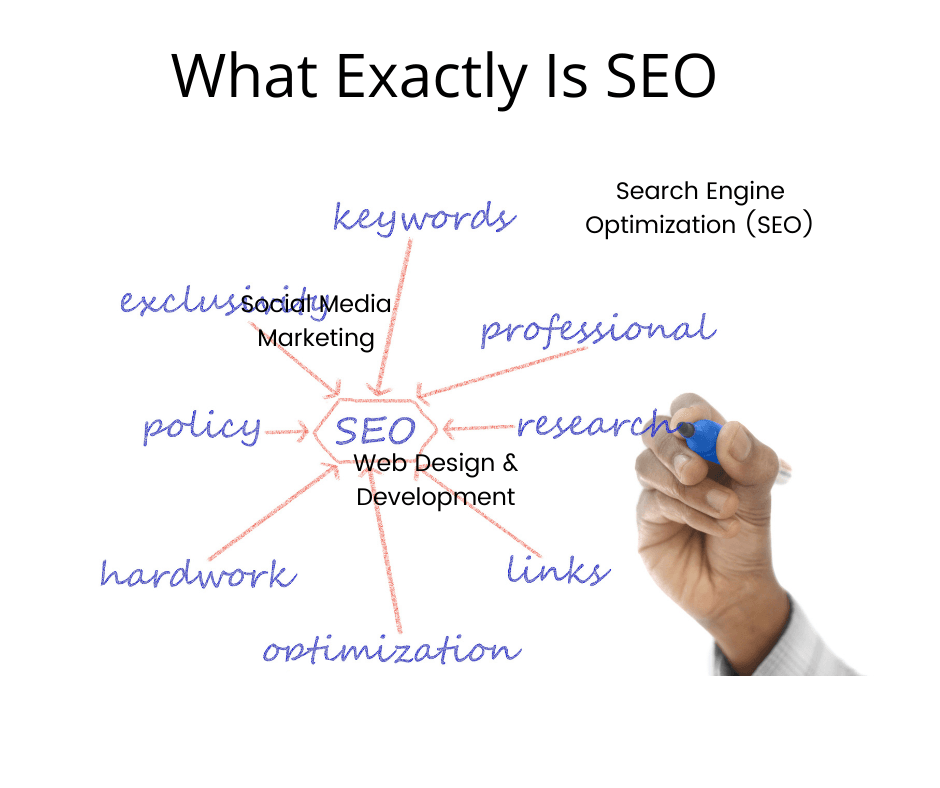
Great and very educative article .
Hi Freda thanks for ready our piece of article. Please remember to share if you find this piece of work to be educative.
Itís difficult to find experienced people in this particular topic, but you seem like you know what youíre talking about! Thanks
I may need your help. I tried many ways but couldn’t solve it, but after reading your article, I think you have a way to help me. I’m looking forward for your reply. Thanks.
hello there thanks for leaving your feedback. How may we assist you today?